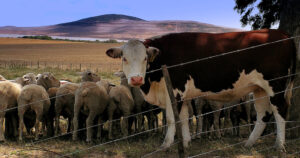 RFID tags are used in all sorts of applications, from tracking inventory to tracking livestock. Now, a lab in Alberta has opened up to test the limits of RFID tags in terms of tracking livestock across the value chain. This, in turn, could help improve RFID tag use in Canada.
RFID tags are used in all sorts of applications, from tracking inventory to tracking livestock. Now, a lab in Alberta has opened up to test the limits of RFID tags in terms of tracking livestock across the value chain. This, in turn, could help improve RFID tag use in Canada.
Canada has a unique set of conditions when it comes to RFID tags. More specifically, tags need to be able to withstand winter conditions, which can drop to -35 degrees Celsius or below. Tags can be left out in trucks where temperatures plummet, which means that the plastic used for the tags can become brittle, less flexible, and more likely to crack when you try to apply them.
In this case, the Southern Alberta Institute of Technology’s (SAIT) Applied Research and Innovation Servicers (ARIS) department in Calgary has been opened. It’s one of only three certified animal RFID testing labs in the world, and the only one in North America. In addition, it’s the only one of two labs that is able to test RFID tags under extremely cold temperatures.
At the lab, researchers look at two main components: how the tag holds up under pressure when being attached, and also how well the tag holds up overall. Because force is required to apply the tag, researchers need to ensure tags don’t come apart or break under the stresses of cold weather.
Failure of a RFID tag isn’t common. However, it can a significant impact on the value chain when it does happen. When it occurs, it requires tracing an animal back to its source when it goes into the slaughterhouse without a tag, which can cost money. This means that these testing facilities are important when it comes to the quality of RFID tags. By creating stronger, longer-lasting tags that can withstand below-freezing temperatures, these researchers can help save the industry thousands.
If you’re interested in RFID tags for your own uses, we have a range of tags than are suitable for tagging livestock, tagging merchandise, or more. Give us a call today to learn how we can help you set up your own RFID tags.
